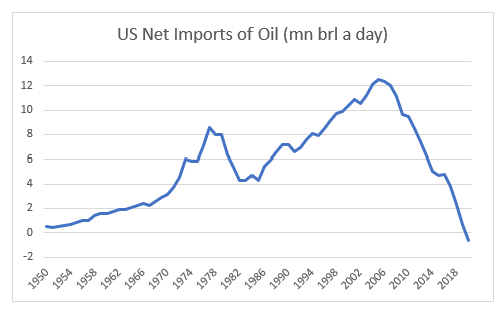The US has always been a reluctant hegemon. While the US brought decisive military power to bear in both World War I and and World War II, it was a late participant to both. The US entered WWI three years after it started, and WWII after two years. In the Post War period, the US has played a far more active role in maintain peace. However, one of the large drivers of a more active US role was the growing reliance on foreign oil. EIA data shows how through the 1950s the US became an ever larger importer of oil. Securing oil supplies led to US engagement in the Middle East, starting with the Suez Canal crisis, and potentially ending with the withdrawal from Iraq.
China is increasingly reliant on commodity imports. Much like the US in the 1960s and 1970s, net imports of oil have been steadily rising. In 2020, Chinese net imports of oil were already at more than 10mn barrels a day, a level the US only eclipsed briefly in the mid 2000s.
However, unlike the US, China is also becoming increasingly reliant on food imports. China has become largest coarse grain importer in Asia.
Using the most recent USDA data, for coarse grains, while China has emerged as a big importer, Ukraine and Russia together has emerged as big exporters.
Ukraine and Russia have also become large exporters of wheat, but China is a large but not dominant importer of wheat. However, in the case of vegetable oil, China is by far the largest consumer, while Russia and Ukraine have become large exporters. Russian and Ukraine are major exporters of sunflower oil, which acts as a competitor to soybean oil and palm oil.
Concerns about supply and strong demand has already led crude palm oil to be priced at all time highs. If supply of sunflower oil from Russia and Ukraine becomes disrupted, then vegetable oil prices could well go higher.
In the post World War II period the US became more involved in world affairs, to both confront the Soviet Union but also to guarantee supply of key commodities. These days the US is largely self sufficient, but China is increasingly reliant on energy and food from Russia and Ukraine. We are left with two questions. Does it serve Chinese interests to let Russia control supply from Ukraine? And if it does not, what is it prepared to do about it?








